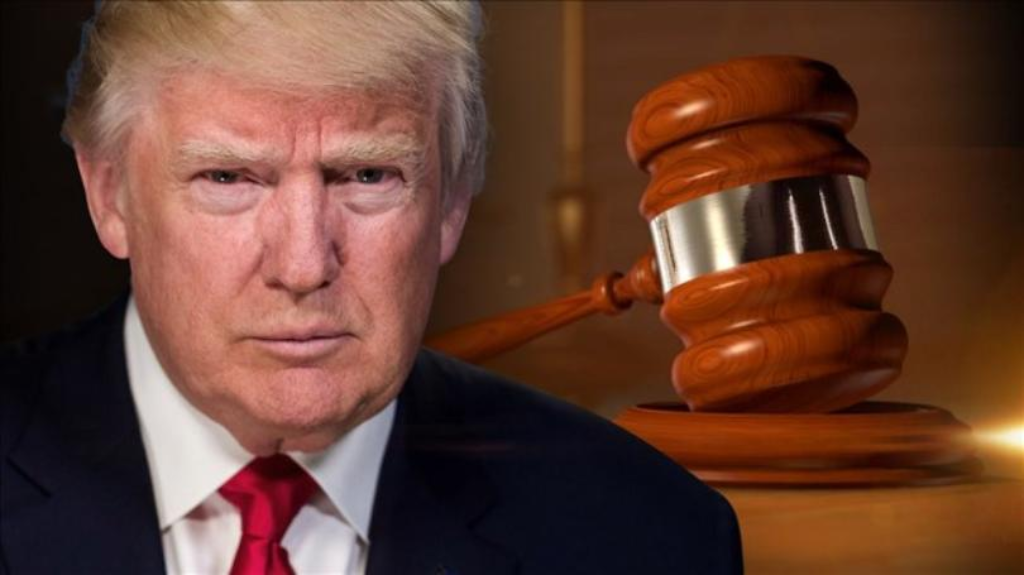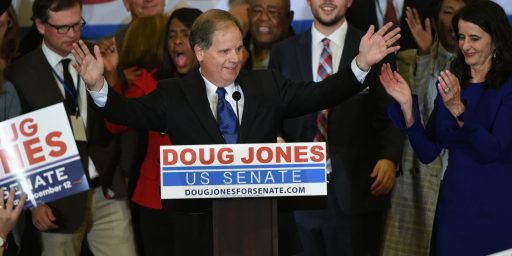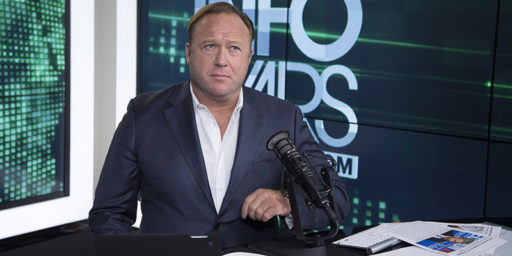New York Judge Allows Charity Fraud Case Against Trump Foundation To Proceed
A state trial court Judge in New York rejected efforts by the Donald Trump to halt a lawsuit alleging charity fraud in connection with the operation of The Trump Foundation.

A state court Judge in New York has rejected an attempt by the Trump Foundation, the charitable foundation established years ago by President Trump, to dismiss a civil lawsuit filed against it by the New York State Attorney General alleging violations of the state’s strict charity laws:
A state judge ruled on Friday that a lawsuit by the New York State attorney general could proceed against President Trump and the Trump Foundation over allegations of misused charitable assets, self-dealing and campaign finance violations during the 2016 presidential campaign.
Mr. Trump’s lawyers had argued that the court did not have jurisdiction over Mr. Trump, as president, and that the statutes of limitations had expired in the case of some of the actions at issue. They also contended the attorney general’s office suffered from a “pervasive bias” against Mr. Trump.
In her 27-page ruling, Justice Saliann Scarpulla disagreed. “I find I have jurisdiction over Mr. Trump,” she wrote.
Alan Futerfas, a lawyer for the Trump Foundation, said in a prepared statement: “The decision means only that the case goes forward. As we have maintained throughout, all of the money raised by the Foundation went to charitable causes to assist those most in need. As a result, we remain confident in the ultimate outcome of these proceedings.”
The White House directed questions to the Trump Organization; a company representative did not immediately respond to a request for comment.
It was the second time this year that a New York State judge in Manhattan had decided that Mr. Trump, just because he is president, is not immune from civil court cases that involve his unofficial activities or actions that took place before he was in office.
In June, Justice Jennifer Schecter ruled that a defamation lawsuit could proceed against Mr. Trump for disparaging women who accused him of sexual misconduct. The suit was brought by Summer Zervos, a former contestant on Mr. Trump’s reality show “The Apprentice.”
Justice Schecter wrote in her ruling: “There is absolutely no authority for dismissing or staying a civil action related purely to unofficial conduct because the defendant is the President of the United States.” Justice Scarpulla quoted the passage in her own ruling.
Justice Scarpulla also cited the decision to allow a sexual harassment suit brought by Paula Jones against Bill Clinton to proceed during his time as president.
The lawsuit against Mr. Trump was filed by Attorney General Barbara Underwood in June. It came after a two-year state investigation into the Trump Foundation found that Mr. Trump and his family had improperly used the charity to settle business disputes and to bolster his campaign for president, even involving it in a 2016 political fund-raiser in Iowa.
The Washington Post, first reported on the allegations regarding apparent improprieties which in the operation of Trump’s charitable foundation back in October 2016, has more on the details of the lawsuit and Post reporter Amber Phillips detailed the implications of these allegations in a post written at the time the lawsuit was first filed:
What’s so striking about this lawsuit is how much wrongdoing it alleges. The lawsuit’s takeaway slams you in the face: Trump’s use of the charity was unethical and illegal. His primary motivation, according to the lawsuit, was to enrich himself rather than helping others. Read another way, the state of New York is alleging that the president’s charity was a sham.
New York attorney general Barbara Underwood, a career official with decades of distinguished legal work, alleges that Trump and his children engaged in “persistently illegal conduct” with the charity.
Trump’s core message to voters was that he could clean up a political system filled with people who are only in public service for themselves. A thorough, nonpartisan investigation by state officials just alleged that for decades, Trump used his own charity, set up to help others, to knowingly help himself. That’s as swampy as it gets.
The Post’s David Fahrenthold first highlighted many of the misuses of funds, like using charity money to decorate one of his golf resorts with a $10,000 portrait of Trump. He reports on the lawsuit: “[B]ehind the scenes, Underwood said, the foundation was essentially one of Trump’s personal checkbooks.”
“Foundations may spend money only to further their charitable missions, but Trump used the foundation as a personal piggy bank,” said Melanie Sloan, an ethics expert and Trump critic.
Of course, Trump is facing numerous ethical and legal inquiries — from his business practices as president, to his fidelity to his wife and payments to women to allegedly keep them quiet, to whether he forcibly kissed and groped women, to whether he tried to obstruct an FBI investigation into his campaign’s ties to Russia.
But to date, most of the allegations and lawsuits only incrementally chip away at the president’s conduct. And he has plenty of plausible deniability to try to convince his supporters that he’s being wrongly attacked.
(…)
This New York lawsuit feels different. It’s much harder to separate the person from the actions. It alleges that he used the charity’s money over the past decade to settle legal disputes involving his for-profit business.
And the lawsuit alleges that when he was running for president, things got worse, not better. It alleges that he used the money to donate to certain veterans’ charities that could be politically beneficial to him, for example.
The lawsuit alleges that this wasn’t just a mistake on his staff’s part, or bad apples in his campaign acting on their own. Trump had been using the charity to enrich himself consistently for decades. He knew what he was doing when he used it to run for president.
Underwood: “Mr. Trump’s wrongful use of the Foundation to benefit his Campaign was willful and knowing.”
In other words, Trump knew he was acting unethically and maybe even illegally. And he did it anyway. Over and over again.
The primary legal issue in the case, whether or not a sitting President can be sued in state court while in office, was really pretty much the legal equivalent of a “no-brainer” thanks to a U.S. Supreme Court decision dating back more than twenty years ago to the Clinton Administration. In Clinton v. Jones, a decision handed down by the Supreme Court in 1997, a largely unanimous Court ruled that a Federal Court civil case brought against former President Bill Clinton by Paula Jones for events that occurred while he was Governor of Arkansas and she was a state employee could proceed forward notwithstanding the fact that the Defendant is the sitting President of the United States. Jones, of course, had filed a lawsuit alleging that Clinton had sexually harassed her in an incident dating back to 1991, claiming that Clinton had her summoned and proceeded to proposition her and engage in other behavior of a sexual nature.
In its ruling, the Supreme Court ruled that the fact that Clinton was President of the United States does not, on its own, grant him any kind of immunity from civil lawsuits for conduct that occurred prior to the time he became President, nor does it require a court hearing such a case to put the case on hold until after the President has left office. To the extent any such immunity existed, it could be found in a concurrence filed by Associate Justice Stephen Breyer in which he stated that there could be some circumstances where a President could seek to delay a civil lawsuit from going forward if it could be shown that responding to and participating in the lawsuit could somehow be shown to interfere with official Presidential duties. Breyer was careful to note, though, that such circumstances would seem to be quite limited and that, in any case, they did not exist with the underlying lawsuit in Clinton v. Jones. Thus, the lawsuit went forward, which of course led directly to a deposition in which Clinton lied under oath about his relationship with Monica Lewinsky, which led directly to a crisis that consumed much of the last two years of Clinton’s Presidency.
In it’s ruling in Clinton v. Jones, the Justices made clear that their decision was only dealing with civil lawsuits in Federal Court and specifically said that they were not ruling on potential issues that might arise with a civil lawsuit in a state court. On the face of it, though, it seems clear that there is no reason to differentiate between a civil lawsuit in state and Federal court. In both cases, the President is capable of hiring competent counsel to represent him in the appropriate jurisdiction, and given the fact that civil cases typically don’t require Defendants to be present in court for proceedings other than a trial on the merits, it’s hard to see how a civil lawsuit in Manhattan should be treated any differently from a Federal Court proceeding that was originally filed in the United States District Court in Arkansas. Additionally, to the extent that the President would be required to make himself available for a deposition the Jones case shows that this too is entirely possible and would not disrupt the President’s focus on his primary duties.
The only significant difference between Clinton v. Jones and this case is that the Jones case was filed in a Federal Court, while the New York Attorney General chose to file her case in state court. As a matter of law, this doesn’t seem to me to be a significant enough difference to defeat the underlying ruling in Jones that says that a sitting President is not immune from civil suits. On the face, though, this is clearly a distinction without a difference. The President is capable of hiring competent counsel to represent him in both situations, for example, and given the fact that civil lawsuits don’t generally require a defendant to be present for pre-trial hearings or anything not related to the presentation of evidence and testimony. Given that, it’s hard to see the difference between a civil suit in a Federal court and one filed in a state court in New York City. Additionally, it’s worth noting Trump’s attorney potentially had the option of removing this case to Federal Court when it was first filed. The fact that they didn’t do so is a strong rebuttal to any argument that a civil proceeding in state court is any more disruptive to the business of the President than a proceeding in a Federal Court in Arkansas was.
In addition to this issue, the Judge also ruled against the President’s claim that the Attorney General’s Office had demonstrated bias against Trump and his business interests, as well as an argument claiming that at least some of the charges against the Foundation were barred by the applicable Statute(s) of Limitation. On a final note, the Court did side with the Trump side on the question of the Attorney General’s request that the Trump Foundation be barred from operating while the case is pending. The primary reason for this, though, appears to be the fact that Trump has already taken steps to shut down and dissolve the foundation and that it does not appear to be operational at this point to begin with. For the most part, then, this was a complete win for the New York Attorney General.
The most significant thing about this ruling, of course, is that it means that the Attorney General’s Office is now free to move forward with discovery against the President. This could include everything from requiring the President to answer written questions and provide documents relevant to the case, requiring him to submit at some point to a deposition at which he would be under oath, and to seek depositions from outside parties that could have information relevant to the case. Given the nature of the claims that this case has raised and the underlying facts, the scope of questioning could end up being quite broad and will no doubt be the subject of significant pre-trial fighting between and among the attorneys. In civil cases, though, the scope of acceptable discovery tends to be rather broad, meaning that Zervos’s attorneys could potentially ask Trump about the claims made by other women regarding sexual harassment claims, affairs, and other sexual improprieties on Trump’s part. This, of course, is why the attorneys for Paula Jones were able to ask President Clinton about his relationship with a certain White House Intern during the government shutdown in 1995 and 1996, and we all know where that led.
Trump’s attorneys could seek to appeal this denial of their stay request to the New York Court of Appeals, the highest level appellate court in New York, but it seems unlikely that court will act where the lower courts have not. In the minds of his supporters, of course, these issues are hardly going to matter. For those who are already skeptical of his Presidency, though, it’s likely to be yet another factor that could motivate them to come to the polls. If that happens, then things could get quite interesting in the as we move forward into an era where the President is likely to face legal headaches not only from this case but also from a number of others filed across the country, from the Mueller investigation, and from a Democratic-controlled House that seems likely to significantly increase the scrutiny placed on Trump, his Administration, and his business and other financial dealings.
Here’s the opinion:
New York v, Trump et al.pdf by on Scribd





Is Justice Saliann Scarpulla Mexican? If she’s Mexican, this judgment is fake (I pray, nay, implore the world to realize I am being sarcastic).
But but but What about executive time? And his golfing? And his hanging out at Mar-a-Lago? And his campaign rallies? And his tweeting? And his…
But her emails!!
Trump University was a sham/scam. The Trump Network was a sham/scam. ACN was a sham/scam.
Why wouldn’t The Trump Foundation be a sham/scam?
You know, for someone who gets sued as often as Trump does, he’s remarkably bad at the whole shebang. You’d think he’d know just from sheer repetition what would and wouldn’t fly with the courts. His lawyers make the stupidest arguments that even a heavily pro-Trump or conservative leaning judge would find offensive to the dignity of the court. If the man has time to dick around on social media for hours at a time every damn day, he’s got time to answer some questions and show up if necessary.
Not to mention that the notion that the President – a mere common citizen temporarily elevated to the highest seat of power by democracy’s whims – is immune to the law and its constraints goes against *everything* a judge stands for. Pissing off a judge is a great way to ruin your day and there’s nothing like telling them they’re not the boss of you to get the irritation flowing.
I wonder why the issues in this suit weren’t raised earlier, if they were prevalent and played out over years.
@Kathy: I’m not following; how are Ivanka’s emails part of this?
Please don’t think that I wish to defend Trump in any way, but we ought to get rid of the whole charity tax exemption stuff. It has become a complex tax avoidance scam that enables rich people to funnel money in directions that meet their interests and little more. If you want to support your alma mater’s football team, improve habitat for the American dipper, fight the scourge of Tsutsugamushi disease, or have a gala for your town’s ballet company, then good for you, but please use after-tax money.
Is he, though? Can a lawyer who’s seen how many others he’s burned one way or another and is still willing to work for him be considered competent?